- Home
- Joel C. Rosenberg
Without Warning Page 7
Without Warning Read online
Page 7
“Second, I have ordered that our borders with Mexico and Canada be closed for the next forty-eight hours. All seaports will be closed to incoming vessels—cruise lines, commercial container ships, private yachts, and so forth—during the same period. This will give the Coast Guard time to make sure we are on top of any possible new threats.
“Third, I have directed the secretary of the Treasury to suspend trading on the New York Stock Exchange and NASDAQ for the remainder of the week. It is my hope and expectation that the markets will reopen on Monday morning. But for now I’m asking the Treasury Department and the SEC to take all measures necessary to safeguard our financial systems against the possibility of terrorists exploiting these attacks or trying to exacerbate their effect to bring harm to the American economy.
“Now I want to be crystal clear—there is no credible evidence that other attacks are coming by land, air, or sea. I am working very closely with the director of National Intelligence, our entire intelligence community, and our allies to review every conceivable threat and every possible lead that will guide us to those responsible. I assure you, we will bring them to justice. I have great confidence in the men and women of our law enforcement community and our military. They are working around the clock to keep us all safe. However, out of an abundance of caution, I am using my authority under the Constitution as your commander in chief to take the measures I deem appropriate to defend every American—and all the visitors under our care—against all threats, foreign and domestic.
“That said, let me take a few moments to share with you some details of what happened last night. At approximately 9:36 p.m., as I delivered the State of the Union address, terrorists unleashed a bombing campaign against the Capitol building using mortar shells fired from artillery pieces positioned in various places around Washington, D.C. Some of the explosive devices were filled with chemical weapons, specifically sarin gas. The damage to the Capitol was extensive, and I regret to inform you that there was significant loss of life. According to the latest information I have been provided with by the secretary of Homeland Security, a total of 136 people died in last night’s attacks. Another ninety-seven were wounded, some of them critically. Among the dead are forty-nine members of the House, nineteen members of the Senate, seventeen members of the press corps, twelve foreign ambassadors, thirty-three guests, three police officers, two D.C. firemen, and one member of my Secret Service detail.”
The number hit me like a punch in the gut. A hundred and thirty-six dead? Ninety-seven more injured? How in the world could this have happened in the most secure facility on the face of the planet, in the heart of the American seat of government?
“Authorities are still notifying the next of kin for a number of these folks,” the president noted. “At the appropriate time, we will post every name on the White House website. When the moment is right, we will hold a memorial service to honor these brave men and women, all of whom deserve our deepest respect. For now, would you join me in a moment of silence to remember these fallen heroes?”
The president bowed his head and closed his eyes. Matt and Agent Harris followed suit. I just stared at the television. A hundred and thirty-six dead in Washington, D.C., at the hands of Abu Khalif. My blood was boiling. I had no doubt every American felt the same.
But for me, this was personal.
16
I should have turned off the television right then.
For when the president began speaking again, what he said absolutely infuriated me.
“My fellow Americans, rest assured that as I speak, the FBI, the Department of Homeland Security, and other federal law enforcement agencies are engaged in a monumental investigation that spans multiple locations, including multiple states and even nations. While it is too early to say who is responsible for these attacks, you have my word that I will keep you updated on critical developments in the hours and days ahead.”
Too early? What in the world was he talking about? There was no question in my mind this was the work of ISIS. I didn’t have solid, incontrovertible proof yet—the kind I could publish, the kind someone could use to prosecute—but I’d bet everything I had this was the work of Abu Khalif. It had his fingerprints all over it. Surely the president had been briefed on the capture of the ISIS cell in Birmingham by now. Surely he knew far more than I did. Why was he hedging? Why not just tell the American people the truth?
“I urge every American to show restraint at this difficult hour,” the president continued. “We must not make the mistake of jumping to conclusions that this was the work of a single organization. And even if it so proves to be, let us not make the mistake of concluding that there was a religious motive to these attacks, much less that this was the work of a single religion.”
Again I recoiled in disgust. Restraint? Was he kidding? Why weren’t we already carpet bombing Raqqa, the ISIS capital in Syria? And no religious motive? What did the president think the I in ISIL stood for anyway?
I bit my tongue, not wanting to explode in front of Harris. The FBI agent had become a valuable source. I didn’t dare risk offending or alienating him. But the president’s equivocation in the face of direct attacks on the American people, our leaders, and our honor made me physically ill.
What’s more, I felt nauseated by his genuflections at the altar of political correctness.
No one in his right mind was accusing the entire Muslim world of trying to kill us. Not the Republicans. Nor the Democrats. So why was the president determined to set up such a straw man?
When the president insisted the vast majority of the Islamic world didn’t want to kill us, that was true, and good—wonderful, even. But survey after survey showed that while some 90 percent of Muslims around the world did not subscribe to the philosophy of violent jihad, somewhere between 7 and 10 percent of Muslims did. I was very glad that nine out of ten Muslims had little or no inclination to violence. But in a world of 1.6 billion Muslims, 10 percent represented some 160 million people. That was equal to half the population of the United States! A nation with a population that large would be the ninth most populous country in the world. This was a big deal. This was a real and serious threat, for it was precisely this pool of 160 million sympathizers and supporters of violence from which ISIS was recruiting.
Yes, Americans wished it could all be over. Taylor certainly did. So did I. We were all exhausted by the conflicts in the Middle East. But the problem wasn’t going away. It was actually getting worse. The last twelve hours proved it. To stick our heads in the sand and pretend we weren’t engaged in a global war of guns and bombs and ideas was as foolish as it was dangerous.
Not once during his State of the Union address—nor during his address to the nation this morning—had Taylor mentioned the Islamic State by name. Rather, last night, as always, he had used the abbreviation ISIL. The acronym was accurate enough. It stood for the “Islamic State of Iraq and the Levant.” But by only using the term ISIL and avoiding the full name, the president was purposefully avoiding using the words Islam and Islamic and Muslim. He was specifically avoiding any mention of the caliphate or any discussion of the theological and eschatological precepts driving Abu Khalif.
In one speech several months earlier, he had actually explained why he refused to say the full name of Khalif’s emerging empire. “The Islamic State is neither Islamic nor a state,” he had argued.
Such nonsense made my blood boil.
How could the president defeat an enemy he refused to define?
17
Then came the bombshell.
“The U.S. and our coalition allies have achieved remarkable victories in the Middle East in the last few months, and we must not allow what has just happened to drive us off target,” the president continued. “As I said last night, we have liberated Mosul. In fact, we have liberated all of northern Iraq and made that entire country safe again. Our work there is nearly finished, and we can be proud of our success. We should be pleased with our progress, and we should s
tay the course. We must not change our strategy or weaken our resolve. We must not allow our enemies to force us to live in fear. Nor are we going to let them lure us into a quagmire that could bog us down for a generation. Our mission is nearly complete. We will bring to justice those who perpetrated this dastardly attack. But when our work is done, I won’t delay for one moment bringing our troops home once again. I will not let terrorists dictate our national security policy. We will not become embroiled in the Middle East forever. We will do our job, and we will move on. To this end, you have my solemn pledge.”
I couldn’t believe what I was hearing, and as I glanced at Matt, it was clear he couldn’t either. Harris was inscrutable, but my brother was livid.
The president’s constitutional mandate was to protect us from all enemies, foreign and domestic. It was, therefore, the president’s solemn responsibility to help the American people understand exactly what we were up against. For Taylor to pretend that ISIS wasn’t involved in these new attacks—or that the fighters working for ISIS, or ISIL, or whatever he wanted to call it, weren’t Muslims and weren’t driven by their interpretation of Islamic theology—was just asinine.
As anyone who had studied their books and speeches and websites and videos could see, the leaders of the Islamic State professed over and over again to anyone who would listen that they didn’t simply want to expel the infidels from the Mideast and North Africa. They wanted to either convert or exterminate the infidels, usher in the coming of their messiah known as the Mahdi, and establish the Islamic kingdom or caliphate that would rule over the entire globe. They weren’t simply trying to conquer the “filthy Zionists” and the “ugly apostates” and “diabolical Crusaders.” They wanted to force every person on the planet to bow down and submit to their version of Islam or be slaughtered. They were diabolically obsessed with bringing to fulfillment the Islamic prophecies supposedly uttered by Muhammad fourteen centuries ago, and they believed they could accelerate the End of Days by engaging in all-out genocide. And not only were they trying to hasten the end of the world through their own violent actions, they were absolutely convinced that Allah required this of them and that they would burn in hell if they did not destroy their enemies.
This was what Abu Khalif and his inner circle believed. This was what drove them. This was what they preached, what they talked about, prayed about, wrote about. This was what they studied, what they thought about, what they rallied their forces around and indoctrinated into their children and their newest recruits. This was what energized and enthused and enraged them. And this was what made Abu Khalif so much more dangerous than Osama bin Laden or any of his colleagues or predecessors. Khalif was not simply a terrorist. He was the head of an apocalyptic, messianic, genocidal death cult, and in his head was a ticking clock counting down to doomsday.
With a plethora of Islamic texts in hand—real or otherwise—Khalif was explaining to his followers and the whole of the Muslim world his view of Allah, his view of mankind, his approach to the End Times, and why it was urgent for all Muslims to get off the sidelines and come join the caliphate.
And it was working. Abu Khalif was winning Muslim recruits in droves.
He had publicly pledged to decapitate the American government. Twice now, he had come dangerously close to achieving his objective. Yet twice in twenty-four hours, the president had refused to mention his name or the name of his movement.
Who was the commander in chief trying to convince by such obvious denial? I wondered. Did he really believe that what had just happened was evidence of our “success” in the war against the caliphate rather than a damning indictment of our failures? The president was living in fantasyland, and it was getting Americans killed.
None of this would be happening, of course, if he had thrown the entire weight of the American intelligence community and military into hunting down and destroying the emir of ISIS. Yet rather than vowing to ramp up our attacks and destroy every last vestige of Abu Khalif and his genocidal forces, the president was repeatedly signaling his intent to end our involvement in Iraq and bring U.S. troops home from the region as rapidly as possible.
That was tantamount to surrender, and I was about to explode.
18
I went straight to the nurses’ station, dressed only in a hospital gown and slippers.
I demanded my suit and my phone. The head nurse said that wasn’t possible. I could get my things back when I was released, and only my attending physician could authorize that, and he wouldn’t be available for another ninety minutes.
“This is still America, isn’t it?” I asked her. “This is still the land of the free and the home of the brave?” Through gritted teeth I made it clear she had two minutes to turn over my personal effects. She dug in her heels.
I was about to go ballistic when Agent Harris stepped up behind me and calmly intervened.
“Ma’am, my two colleagues and I are leaving here in five minutes,” he said in that firm, authoritative, no-nonsense tone they must teach new recruits down at the FBI training center in Quantico. “Now, we would be grateful if you would provide us our personal effects immediately.”
It worked. Within moments, Matt, Harris, and I had everything we needed. Less than five minutes later we were in a cab heading straight to the J. Edgar Hoover Building.
Harris kept his cards close to the vest. He wouldn’t tell us what he had in mind, but he didn’t disabuse me of the notion he was taking us to look at some of the evidence the bureau had compiled so far on who might be responsible for these attacks so I could write a story for the Times. For the moment, though, he merely assured us that at the bureau we could get a change of clothes and a shower before we went any further.
The District of Columbia looked like a ghost town. In normal times, the five inches of snow alone would have led to the shutdown of all government buildings, schools, shops, and private businesses. But these were clearly not normal times.
The fires at the Capitol building had finally been put out, but all of Capitol Hill was now a hazmat disaster area. Specialists in chem-bio gear were swarming over the grounds and through the rubble of the Senate Chamber.
The cab driver had a local news station playing. We learned that every unsecured building in a twenty-block radius of the Capitol had been evacuated due to the threat of chemical weapons contamination. Meanwhile, the entire corridor between the White House and the Capitol had become a crime scene. It had been cordoned off from the public as the FBI, Secret Service, D.C. Metro police, and other law enforcement agencies gathered evidence. At the same time, a massive manhunt was under way for any and all suspects who had participated in the highly coordinated attacks.
Harris sat in the front and made several calls. Matt and I sat in back, with Harris’s crutches across our laps. Matt immediately called Annie. He assured her—and our mom, who was on the extension—that we were alive and safe and had just been released from the hospital. He apologized that we hadn’t been able to call earlier and explained what we’d been through.
Meanwhile, I speed-dialed Allen. After assuring him I was okay, I dictated an eyewitness account of what it had been like to be inside the House Chamber and on Pennsylvania Avenue during the attacks. It was all I could do not to let my personal outrage at the president come through, and for the most part I was successful. Allen was relieved to know I was all right, and he was grateful to get my first dispatch. He told me it would be posted on the Times homepage within the hour. I told him I was en route to FBI headquarters and would keep him posted on what I learned.
Moments later, we arrived at the Hoover Building. The main entrance was closed and heavily guarded, so the cabbie pulled up to the E Street entrance. I got out first and helped Harris with his crutches, then turned to Matt and suggested he head to my apartment in Arlington and get some rest.
“No, J. B. I want to stay with you,” Matt insisted.
I shook my head. “I need to focus. And you need to rest. Go to my place. I’ll link up
with you as soon as I can.”
“You sure?” he said.
“Absolutely,” I said, then had an idea. “In fact, you should find a way to get up to Bar Harbor. You need to be with Annie and the kids. Don’t worry about the cost. I’ll cover it.”
“You’re serious?” he asked.
“Hey,” I said. “It’s the least I can do.”
I hoped this might ease my conscience a little. My pursuit of the ISIS story had put my family in danger. I was single, making decent money, and had very few expenses. Matt, on the other hand, was a seminary professor. He wasn’t exactly swimming in cash, and he had a wife and two young kids to support. I was sure he’d blown a good part of his meager savings to buy last-minute airline tickets to evacuate himself and his family out of Amman. Paying for him to get to Bar Harbor really was the least I could do.
“Let’s go, Collins,” Harris said, glancing at his watch. “We need to move.”
I nodded and paid the cabbie the current fare plus enough to get my brother back across the Potomac to Arlington. I gave Matt my apartment key and my Visa card. He thanked me and made me promise I’d call home and tell Mom I was okay. Then the cab pulled away.
“Come on,” Harris said. “There’s something you need to see.”
19
J. EDGAR HOOVER BUILDING, WASHINGTON, D.C.
We cleared security and boarded an elevator.
Harris positioned himself so I couldn’t see what button he had pushed.
“Why are you doing this?” I asked.
“Doing what?”

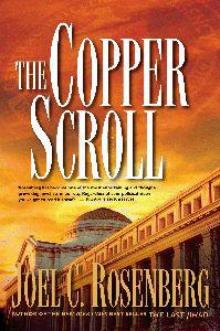 The Copper Scroll
The Copper Scroll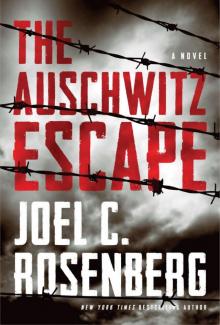 The Auschwitz Escape
The Auschwitz Escape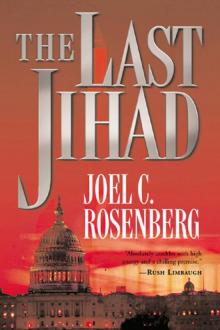 The Last Jihad
The Last Jihad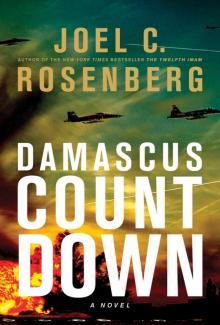 Damascus Countdown
Damascus Countdown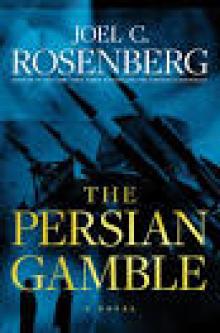 The Persian Gamble
The Persian Gamble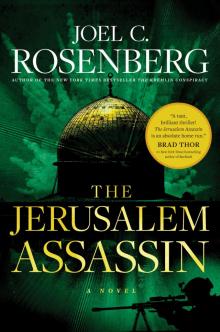 The Jerusalem Assassin
The Jerusalem Assassin Dead Heat
Dead Heat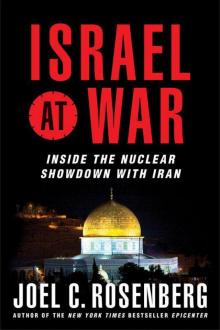 Israel at War: Inside the Nuclear Showdown With Iran
Israel at War: Inside the Nuclear Showdown With Iran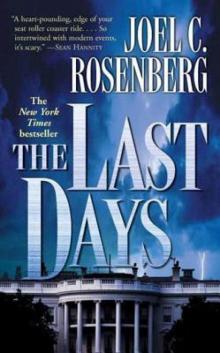 The Last Days
The Last Days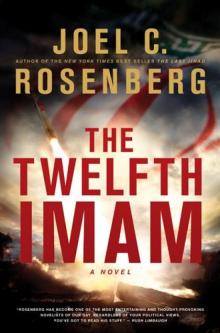 The Twelfth Imam
The Twelfth Imam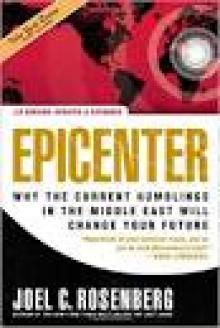 Epicenter 2.0
Epicenter 2.0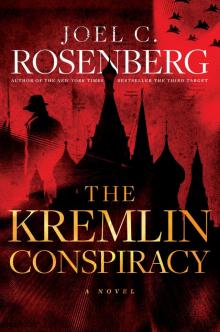 The Kremlin Conspiracy
The Kremlin Conspiracy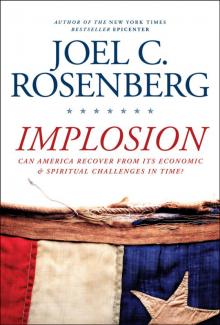 Implosion: Can America Recover From Its Economic and Spiritual Challenges in Time?
Implosion: Can America Recover From Its Economic and Spiritual Challenges in Time?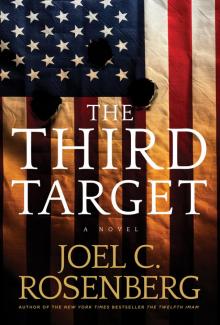 The Third Target: A J. B. Collins Novel
The Third Target: A J. B. Collins Novel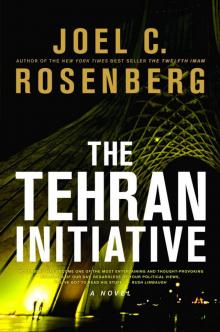 The Tehran Initiative
The Tehran Initiative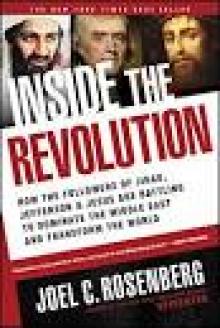 Inside the Revolution
Inside the Revolution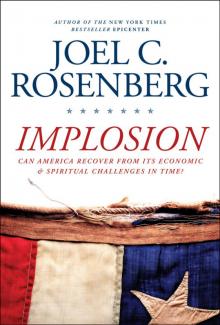 Implosion
Implosion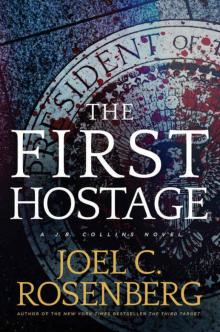 The First Hostage: A J. B. Collins Novel
The First Hostage: A J. B. Collins Novel